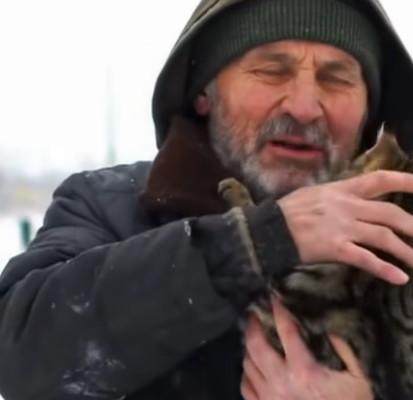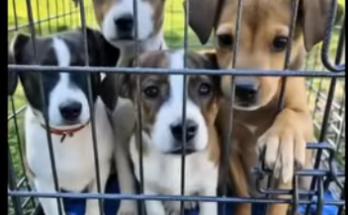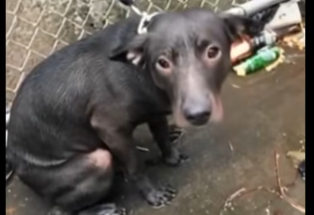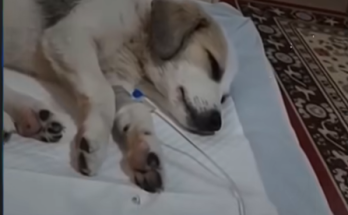I was walking out of the pharmacy with my 7-year-old daughter, Emma. Life had been hard ever since my wife passed away eight months ago. Grief was a constant shadow, and balancing work with solo parenting left me drained most days.
As I helped Emma into the backseat of our car, I noticed someone sitting near the bus stop at the corner of the parking lot. It was a man in his late fifties, wrapped in a threadbare coat, his face tired and weather-worn. Curled up in his lap was a skinny tabby cat, its fur matted, ears twitching from the cold.
Just as I opened the driver’s side door, the man slowly stood and walked toward us. I felt a moment of unease—these situations can be unpredictable. He stopped a few feet away, his hands shaking slightly, not from fear, but from cold or hunger—I couldn’t tell.
“Sir,” he said, voice rough but gentle, “I’m sorry to bother you, but… could you take my cat?”
For a second, I just stood there, unsure if I’d heard him right. “Take your cat?”
He nodded, looking down. “I can’t keep her warm anymore. I haven’t eaten in two days, and I don’t know where I’ll end up tomorrow. But she… she deserves better than this.”
Emma had slipped out of the car again, crouching by the man’s feet to pet the small animal. The cat leaned into her hand, purring softly.
“Her name’s Miso,” he added. “She’s gentle. Never hurt a soul.”
There was something about the way he looked at her—like he was letting go of the last piece of comfort he had.
I hesitated. I’d never owned a cat, and taking on another responsibility in the middle of so much chaos felt overwhelming. But as I watched Emma quietly cradling the cat in her arms, I realized it wasn’t really a decision I needed to think through.
“Alright,” I said. “We’ll take her.”
He looked stunned for a moment, then quietly crouched to kiss the cat on the head. “Thank you,” he whispered. “You’re saving her life.”
I offered him some granola bars and a bottled water from our shopping bag, but he shook his head. “Give that to someone else. You’ve already given me more than enough.”
As we drove home, Emma held Miso like a treasure. That night, the cat slept curled up at her feet, as if she’d always belonged there.
Weeks passed. Miso adjusted quickly to our home, and I found myself grateful for her calming presence. She brought comfort not just to Emma, but to me as well—her soft purring filling the silence that had settled over our house since my wife’s passing.
Then, one snowy morning about two weeks later, I found a small envelope in our mailbox. There was no return address, just my name in careful handwriting.
Inside was a short note:
“Thank you for taking Miso in. I watched from across the lot as you drove away. I had nothing left but her, and knowing she’s safe gives me peace. You’ve done more than you know. I’ve since found a spot at a shelter and started working odd jobs. Maybe things can turn around. —L.”
I stood there holding the note, heart heavy and hopeful all at once. “This isn’t right, I have to do more.”
That note stuck with me. All day. For weeks, actually.
Who was this man? Where was he now? Was he really okay, or just trying to make me feel better? I couldn’t get rid of this gnawing feeling—like I’d closed a door too soon. Sure, we’d taken Miso in, and that alone was meaningful. But it didn’t sit right with me to stop there.
So one morning, after dropping Emma at school, I stopped by the pharmacy parking lot again. Same corner. Same bus stop. I scanned the area, even asked a couple of local employees if they’d seen a man in a threadbare coat with a cat.
“Yeah,” the cashier at the gas station next door said. “Used to sit out there a lot. Quiet guy. Gave his cat away to someone, I think. Haven’t seen him since.”
“Do you know his name?”
“Nope. Sorry. But he used to hang around the soup kitchen two streets down. You could try there.”
I did. And that visit led me down a path I hadn’t expected.
The woman running the soup kitchen—Linda—nodded immediately when I described him. “We call him Larry. Real polite. Keeps to himself. He came in with a cat for months, always made sure she ate before he did. Last I heard, he got into a halfway program.”
I don’t know what it was—maybe the fact that someone had cared so deeply for a small animal even while starving. Or maybe it was because I saw pieces of myself in him: someone trying to hold on after losing everything.
“Do you know where I can find him now?” I asked.
Linda smiled. “I can ask around.”
A few days later, she called me. “He’s staying at the old Pine Hollow Shelter, just outside town.”
That Saturday, I left Emma with my sister and drove over.
The shelter was small, tucked behind a church, half-covered in snow. I introduced myself at the front desk and explained the story, not sure what I expected. A warm reunion? Gratitude? I just knew I couldn’t ignore this feeling.
Ten minutes later, Larry walked into the lobby, wearing a donated jacket and looking a little stronger than before—but still surprised to see me.
“You found me,” he said, eyes wide.
I nodded. “I got your note. I just… I wanted to make sure you were okay.”
He smiled, slow and grateful. “I’m better. Thank you.”
We talked for over an hour. I told him how Miso had helped Emma sleep through the night again, how the cat had taken to curling up next to the framed photo of my late wife as if she knew what we’d lost. I told him how Miso had made the house feel warmer—not just temperature-wise, but emotionally. And he listened, nodding, eyes misty.
“I thought giving her away would break me,” he said softly. “But it gave me a reason to keep going.”
That was the start of something neither of us expected.
I started visiting Larry once a week. Sometimes we’d grab coffee. Sometimes we’d just talk in the parking lot of the shelter. He told me he used to be a mechanic. Lost his job after an injury. Then his apartment. His brother died, and there was no one left. He said Miso had kept him sane.
Over time, something inside me shifted. Helping Larry helped me heal. For months, I’d been living like a ghost, just getting through the day. But being around someone who’d had so little and still kept kindness in his heart made me realize how much I still had—and how much I’d stopped appreciating it.
I talked to a friend of mine who owned an auto shop and arranged an interview for Larry. He was hesitant at first—didn’t want a handout—but he showed up, and after a few weeks of training, he was back under the hood of cars, grease on his hands, a proud smile on his face.
I’ll never forget the day he got his first paycheck. He used part of it to buy Emma a small cat toy for Miso and handed me a note.
“None of this would’ve happened if you hadn’t stopped that day,” he wrote. “You saved more than just a cat.”
Fast-forward three months, Larry had moved into a tiny apartment above the shop. It wasn’t much, but it was his. He even asked if he could visit Miso one weekend. I said yes, of course.
Emma opened the door for him that Saturday, beaming. Miso ran straight to him, recognizing him immediately. She curled around his leg, purring loudly, and he sat on the floor like an old friend.
They stayed like that for half an hour—Miso purring, Larry whispering things I couldn’t quite hear. But I didn’t need to. I saw the way both of them relaxed, like pieces of a puzzle that still clicked together, even if the rest of the picture had changed.
Later that evening, Emma asked, “Can Larry come over again sometime?”
I smiled. “Anytime he wants.”
That winter, Larry helped us shovel snow. The spring after, he fixed my old lawnmower. And the summer that followed, he taught Emma how to change a tire. He became part of our lives—not replacing what we’d lost, but adding to what we had.
Looking back, it all started with a small, trembling question from a stranger who had nothing left: “Could you take my cat?”
That moment changed everything.
And here’s the truth: sometimes the smallest acts of kindness echo in ways you can’t imagine. You think you’re helping someone else, but somehow, they end up healing you too.
If I hadn’t said yes that day, I don’t know where Larry—or honestly, where I—would be. But I do know this: opening your heart, even when it’s hurting, is one of the bravest things you can do.
So if life ever hands you a moment that feels random or inconvenient, maybe pause and listen. There might be a reason. There might be someone out there who just needs a bit of kindness to turn their story around.
And maybe, just maybe, they’ll help rewrite yours too.
If this story touched your heart, give it a like or share it with someone who believes in second chances. You never know who might need to hear it today.



